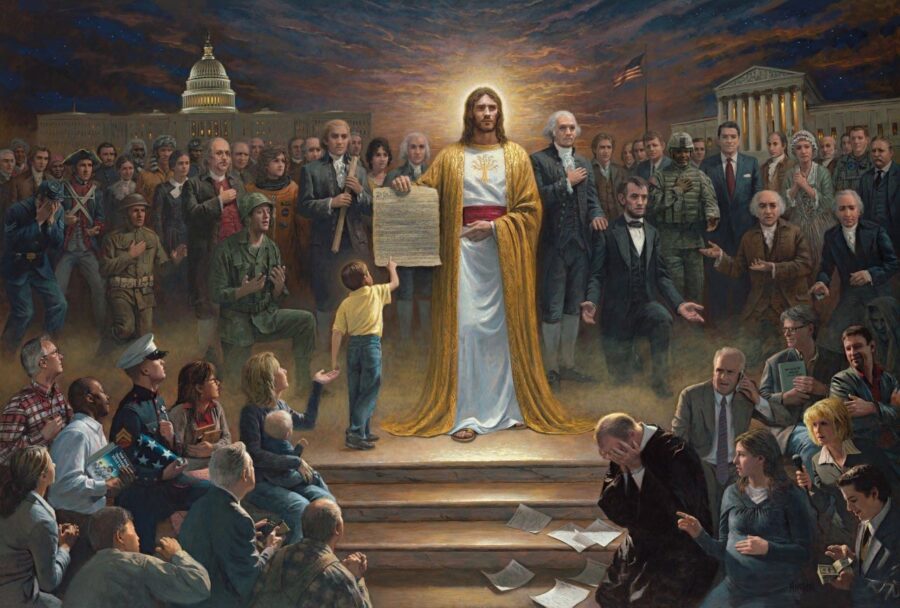Since the regrettable events in Charlottesville, Donald Trump has been fond of proclaiming (and tweeting) that Americans should “come together as one.”
We ALL must be united & condemn all that hate stands for. There is no place for this kind of violence in America. Lets come together as one!
— Donald J. Trump (@realDonaldTrump) August 12, 2017
The message rings hollow at the moment for many Americans who feel that Trump’s recent statements (and official pardons) only further deepen the divide among Americans. And despite glimpses of the best of American solidarity in the awful aftermath of Hurricane Harvey, many will agree that the future continues to look bleak when it comes to meaningful unity in this one nation, under God, indivisible.
But is the same outlook true for Christian unity? As Christians, the call to unity is foundational. It represents the very heart of Jesus’ prayer in John 17: “May they be one as we are one.” Unity is the prominent, if not central, theme in the letters of Paul. And yet, in this moment, appeals to Christian unity (particularly in America, but also abroad) strike many as increasingly naïve and in danger of coming undone. This week’s #NashvilleStatement and its varying responses is the latest milemarker of an already growing divide concerning the collective identity of so-called Evangelical Christians. Some feel the designation “Evangelical” irrevocably tainted from its political ties with the Trump administration; others have expressed the designation too important historically to cast aside (or at least fail to see a proper alternative); and yes, others feel just fine, thank you—pass the pepper.
It’s helpful at this point to remember just what it is that unites Christians together. It is not a statement of political beliefs. It is not a shared conviction of sexual ethics and gender. It is not a cross-denominational platform or creed. As important as many of these things are, they are not what makes Christians one.
What unites us as God’s children is the Spirit of God himself.
“For in one Spirit we were all baptized into one body — Jews or Greeks, slaves or free– all were made to drink of one Spirit.” (1 Cor 12:12).
It is the Spirit “who bears witness with our spirits that we are children of God” (Rom 8:16). And those who do not have the Spirit do not belong to Christ. (Rom 8:9). The Spirit consistently proves to be the essential link in common for all who bear the name of Christ. Indeed, even the confession of faith in Jesus as Lord comes about by the Spirit himself (1 Cor 12:2).
I join a growing number of scholars who recognize that the shared spirit among all Christians is not unlike the blood that ties a natural family together (of course, though not reducible to it). The metaphor is not without some serious limitations, but it is helpful insofar as it captures what Paul is communicating about the Spirit of the Son sent into our hearts (Gal 4:6). The Spirit is he that makes us one. The Spirit himself elicits the shared confession of “Jesus is Lord” and “Abba Father.” So the idea of Christians as “one family” is not quite a metaphor, but rather a spiritual, even ontological reality. While many scholars are prone to call the earliest Christians a “fictive family,” bound together by a “fictive kinship,” I’m inclined to think that Paul himself would have bristled at the thought. Members of Christ’s body are in fact one family by their receiving (drinking!) of the one Spirit, being adopted as sons and daughters of God through the Spirit of the Son.
So can this one family disagree and remain one family? Yes, though painfully. The #NashvilleStatement is just the latest example of a line drawn in the sand among Christians. The responses have been swift and numerous; a coming together feels less and less likely. But however strongly we may disagree with someone on the other side of this debate, we are urged to remember that such a person is the brother and sister for whom Christ died. I am not simply saying Christians can or should ‘agree to disagree’ on the #NashvilleStatement. I am, however, advising that we remember that entering this debate will often mean a fight within the family. Whenever any family is torn apart, the results are devastating—and we are experiencing this firsthand. You can ‘unfriend’ friends on Facebook, but you can’t ‘unfamily’ family (however much many of us might like to). I am not suggesting that this is the answer to our problems; appeals to spiritual unity is not the last word to any debate; it is only the first word (indeed Scripture often puts the Spirit at the beginning of things; we have “begun with the Spirit” (Gal 3:3)). Where we go from here has much to do with how well we hear his voice and respond in humility, obedience, and love.
It is my sincere prayer that Christians can increasingly display meaningful and public unity and that the church can reflect the reality of God’s welcoming grace that welcomes and reconciles all people into one family (those who are far, those who are enemies, those who come from different backgrounds and groups). The path to realizing such unity is costly, requiring nothing short of an act of God, but it is my prayer such as it is. It is also my lament, in this present time, that our family is publicly and troublingly divided. Lord, hear our prayers.
May we “maintain the unity of the Spirit in the bond of peace.”





Leave a Reply
Your email is safe with us.